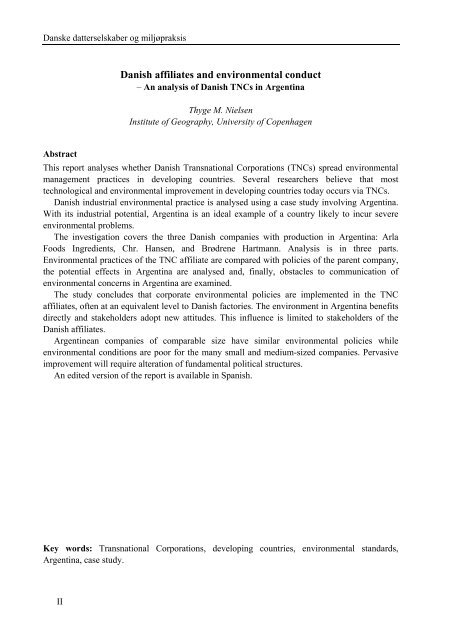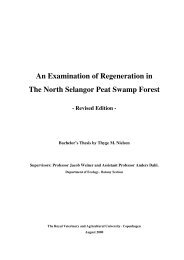Danske datterselskaber og miljøpraksis – en ... - Thyge M. Nielsen
Danske datterselskaber og miljøpraksis – en ... - Thyge M. Nielsen
Danske datterselskaber og miljøpraksis – en ... - Thyge M. Nielsen
You also want an ePaper? Increase the reach of your titles
YUMPU automatically turns print PDFs into web optimized ePapers that Google loves.
<strong>Danske</strong> <strong>datterselskaber</strong> <strong>og</strong> <strong>miljøpraksis</strong><br />
II<br />
Danish affiliates and <strong>en</strong>vironm<strong>en</strong>tal conduct<br />
<strong>–</strong> An analysis of Danish TNCs in Arg<strong>en</strong>tina<br />
<strong>Thyge</strong> M. Niels<strong>en</strong><br />
Institute of Ge<strong>og</strong>raphy, University of Cop<strong>en</strong>hag<strong>en</strong><br />
Abstract<br />
This report analyses whether Danish Transnational Corporations (TNCs) spread <strong>en</strong>vironm<strong>en</strong>tal<br />
managem<strong>en</strong>t practices in developing countries. Several researchers believe that most<br />
technol<strong>og</strong>ical and <strong>en</strong>vironm<strong>en</strong>tal improvem<strong>en</strong>t in developing countries today occurs via TNCs.<br />
Danish industrial <strong>en</strong>vironm<strong>en</strong>tal practice is analysed using a case study involving Arg<strong>en</strong>tina.<br />
With its industrial pot<strong>en</strong>tial, Arg<strong>en</strong>tina is an ideal example of a country likely to incur severe<br />
<strong>en</strong>vironm<strong>en</strong>tal problems.<br />
The investigation covers the three Danish companies with production in Arg<strong>en</strong>tina: Arla<br />
Foods Ingredi<strong>en</strong>ts, Chr. Hans<strong>en</strong>, and Brødr<strong>en</strong>e Hartmann. Analysis is in three parts.<br />
Environm<strong>en</strong>tal practices of the TNC affiliate are compared with policies of the par<strong>en</strong>t company,<br />
the pot<strong>en</strong>tial effects in Arg<strong>en</strong>tina are analysed and, finally, obstacles to communication of<br />
<strong>en</strong>vironm<strong>en</strong>tal concerns in Arg<strong>en</strong>tina are examined.<br />
The study concludes that corporate <strong>en</strong>vironm<strong>en</strong>tal policies are implem<strong>en</strong>ted in the TNC<br />
affiliates, oft<strong>en</strong> at an equival<strong>en</strong>t level to Danish factories. The <strong>en</strong>vironm<strong>en</strong>t in Arg<strong>en</strong>tina b<strong>en</strong>efits<br />
directly and stakeholders adopt new attitudes. This influ<strong>en</strong>ce is limited to stakeholders of the<br />
Danish affiliates.<br />
Arg<strong>en</strong>tinean companies of comparable size have similar <strong>en</strong>vironm<strong>en</strong>tal policies while<br />
<strong>en</strong>vironm<strong>en</strong>tal conditions are poor for the many small and medium-sized companies. Pervasive<br />
improvem<strong>en</strong>t will require alteration of fundam<strong>en</strong>tal political structures.<br />
An edited version of the report is available in Spanish.<br />
Key words: Transnational Corporations, developing countries, <strong>en</strong>vironm<strong>en</strong>tal standards,<br />
Arg<strong>en</strong>tina, case study.



